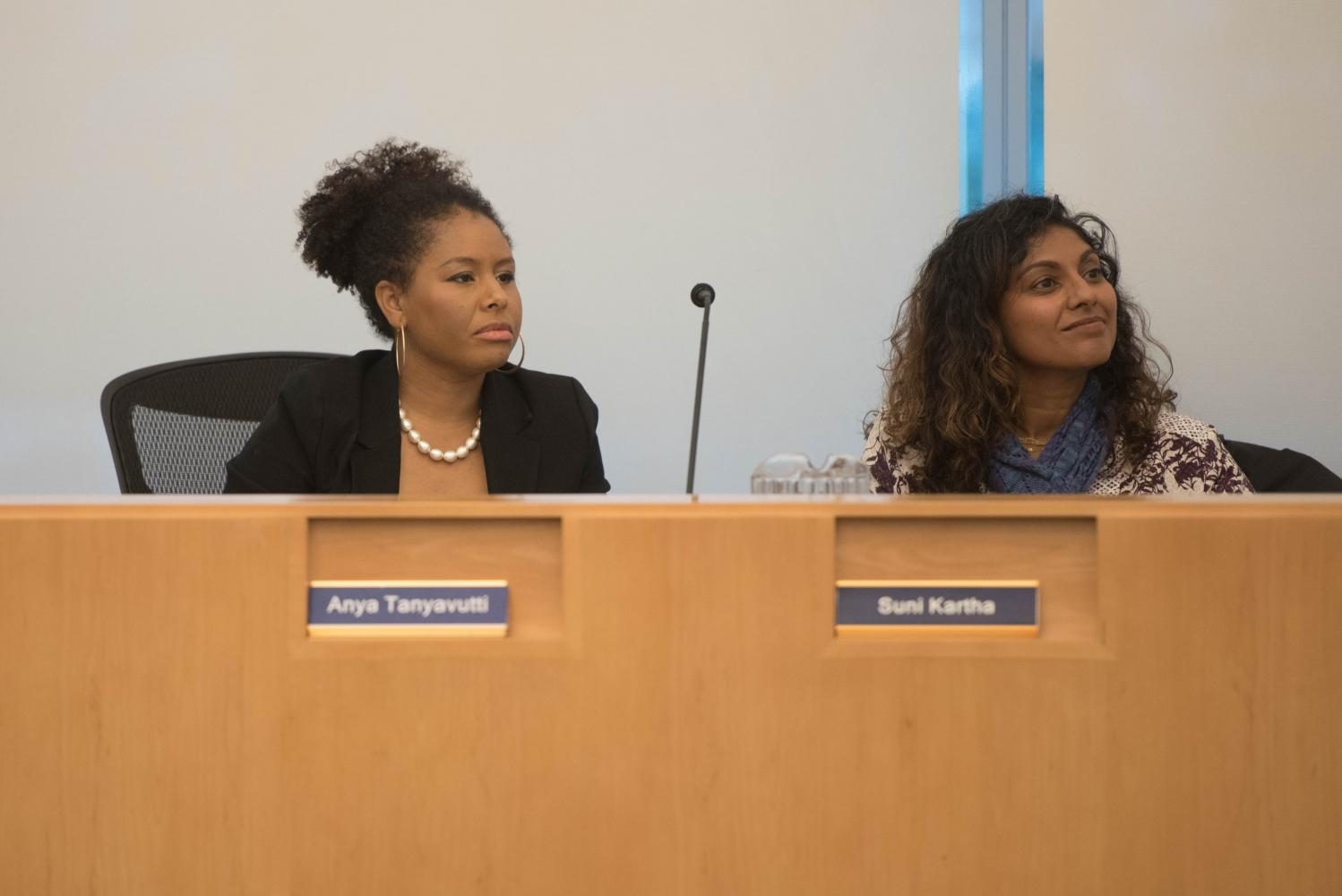D65 board approves consolidation of 8th grade algebra courses
Daily file photo by Allie Goulding
Evanston/Skokie District 65 school board vice president Anya Tanyavutti and president Suni Kartha watch a speaker at a board meeting. Tanyavutti and Kartha both voted in favor of the algebra consolidation plan Monday, which passed 5-1.
June 13, 2017
Responding to data which showed placing 8th grade students into separate Algebra 1 and Algebra 8 courses led to racial inequality, Evanston/Skokie District 65 school board members voted on Monday to combine the two courses.
The initiative passed 5-1, and will enroll future 8th graders in Algebra 1 and create an “Algebra Excite” course for students identified as unlikely to pass Algebra 1 during their first time taking the class. Former board president Candance Chow was the lone board member to vote against the measure.
After hearing the results of a study by District 65 STEM Department director Matsuo Marti, the board approved the plan, which will be implemented at one of the district’s three middle schools during the 2017-18 school year and then district-wide starting in 2018-19.
“This corrective shift is to eliminate a delineation that is harming students and is unnecessary academically,” board vice president Anya Tanyavutti said at the meeting. “I believe this is equity in action.”
Previously, students were placed into either Algebra 1 or Algebra 8 based on the results of two standardized math tests. The racial breakdowns of the two courses ended up very polarized: Between 2014 and 2017, Algebra 1 courses were 69 percent white students and 8 percent black students, while Algebra 8 courses were 30 percent white students and 35 percent black students, according to a board report.
Board president Suni Kartha said the idea to consolidate the algebra courses originated at least five years ago, when Algebra 1 followed a more challenging curriculum than Algebra 8. In the time since, middle school teachers have begun using the same textbook and teaching the same curriculum in both courses, Kartha said.
As a result, the separation fostered a sense of inferiority among Algebra 8 students — and led to “de facto” separation even in non-mathematics classes — even though they were learning the same material as Algebra 1 peers, Marti said.
Board member Sergio Hernandez voiced strong support for the consolidation plan during a lengthy two-hour discussion.
“It heartens me to hear that we, as a district, are going to be bold in trying to create a change that is very necessary,” board member Sergio Hernandez said. “The communities that ask us, ‘What are you going to do?’ This is the first step.”
Parents of District 65 students also spoke during the first portion of the meeting. Most voiced support for the de-tracking initiative, including one parent who compared the current algebra assignment system to the “separate but equal” mantra of the segregated southern U.S. prior to 1954.
The plan presented by Marti initially included a recommendation that the board commit to the de-tracking for at least five years. During the discussion, however, board members Chow and Lindsay Cohen voiced concerns about the forced commitment despite lingering questions, and the recommendation was removed from the material voted on.
Chow also suggested waiting six to 12 months before either voting on or implementing the consolidation in order to better inform parents, partially because some now-obsolete math placement letters had already been sent to parents of rising 8th graders. Kartha, however, said she failed to understand Chow’s hesitancy.
“This is not a significant change, (but) there’s a perception that it is,” Kartha said. “All the kids are (already) taking the same class. This is just removing the labels of the class.”
Email: [email protected]
Twitter: @benpope111


